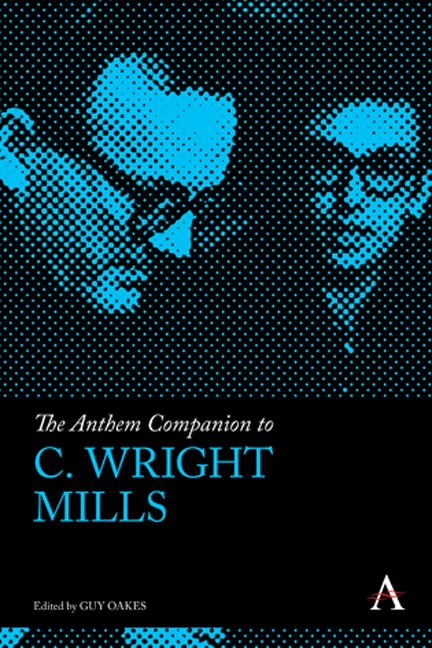Book contents
- Frontmatter
- Contents
- List of Tables
- Acknowledgments
- Introduction American Faust
- Chapter 1 C. Wright Mills on Law and Society: Hidden in Plain Sight?
- Chapter 2 Mills on the Economics of the Old Middle Class
- Chapter 3 Revisiting C. Wright Mills on the Militarization of Postwar American Society
- Chapter 4 A Critical Assessment of the Historical and Economic Underpinnings of C. Wright Mills's The Power Elite
- Chapter 5 Mills as Ethical Theorist: The Military Metaphysics and the Higher Immorality
- Chapter 6 C. Wright Mills and Latin America
- Chapter 7 For a Feminist Sociological Imagination: A Personal Retrospective on C. Wright Mills
- Chapter 8 The Sociological Imagination: A Reductionist Reading
- Chapter 9 Recent Changes in the Shape of Power
- Afterword. Mills as Classic?
- Contributors
- Index
Chapter 5 - Mills as Ethical Theorist: The Military Metaphysics and the Higher Immorality
Published online by Cambridge University Press: 17 June 2017
- Frontmatter
- Contents
- List of Tables
- Acknowledgments
- Introduction American Faust
- Chapter 1 C. Wright Mills on Law and Society: Hidden in Plain Sight?
- Chapter 2 Mills on the Economics of the Old Middle Class
- Chapter 3 Revisiting C. Wright Mills on the Militarization of Postwar American Society
- Chapter 4 A Critical Assessment of the Historical and Economic Underpinnings of C. Wright Mills's The Power Elite
- Chapter 5 Mills as Ethical Theorist: The Military Metaphysics and the Higher Immorality
- Chapter 6 C. Wright Mills and Latin America
- Chapter 7 For a Feminist Sociological Imagination: A Personal Retrospective on C. Wright Mills
- Chapter 8 The Sociological Imagination: A Reductionist Reading
- Chapter 9 Recent Changes in the Shape of Power
- Afterword. Mills as Classic?
- Contributors
- Index
Summary
American Nihilism
White Collar was C. Wright Mills's first popular success, the book in which he achieved entrée to the broader readership outside academia that he coveted. In the introduction, he wrote an impressionistic survey of the mentality of the white, middle-class, salaried employees who were his contemporaries – generally living in cities or suburbs and for the most part employed by large organizations. The material poverty suffered by industrial workers of the nineteenth century had been replaced by moral and psychological impoverishment. The man of the middle classes – Mills did not mention women at this point – had no “firm roots or sure loyalties to sustain his life and give it a center.” Without direction, he lived frenetically; but he was also “paralyzed with fear,” exhibiting “the most profound apathy of modern times” (Mills 1951, xvi). Was this the inner world of postwar US affluence: the generation of young adults enjoying liberal funding for higher education, easy credit and low interest rates, high levels of employment and income, home ownership, family formation and upward mobility – Americans living the American dream? It seems implausible. Yet, Mills was convinced not only of the social pathology of “apprehensiveness, pessimism, tension” and “‘spiritual disillusionment’ with the social order” (329). He was confident he had discovered its source. The certitudes of an earlier era had collapsed. “No new sanctions or justifications for the new routines we live, and must live, have taken hold.” Because the postwar middle classes had no commitments or ideals, they were “morally defenseless as individuals and politically impotent as a group” (xvi).
Within a year, Mills, ever alert to the marketing value of arresting phrases, had a name for the new pathology. In an article for the New York Times Magazine of November 23, 1952, entitled “A Diagnosis of Our Moral Uneasiness,” he christened it “the higher immorality.” Reprising his ideas in White Collar, he claimed that although “the older values and codes of uprightness no longer grip us, they have not been replaced.” The fall of the traditional moral order created an ethical vacuum in both public and private life, leaving individuals confused about the meaning of their personal troubles and incapable of translating them into issues of public affairs – matters they regarded with indifference.
- Type
- Chapter
- Information
- The Anthem Companion to C. Wright Mills , pp. 99 - 118Publisher: Anthem PressPrint publication year: 2016



